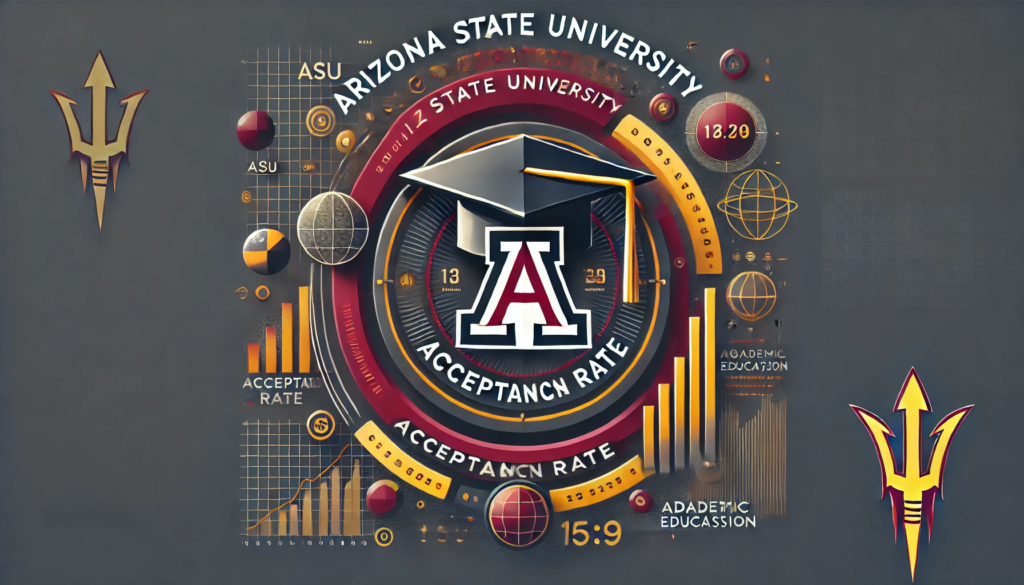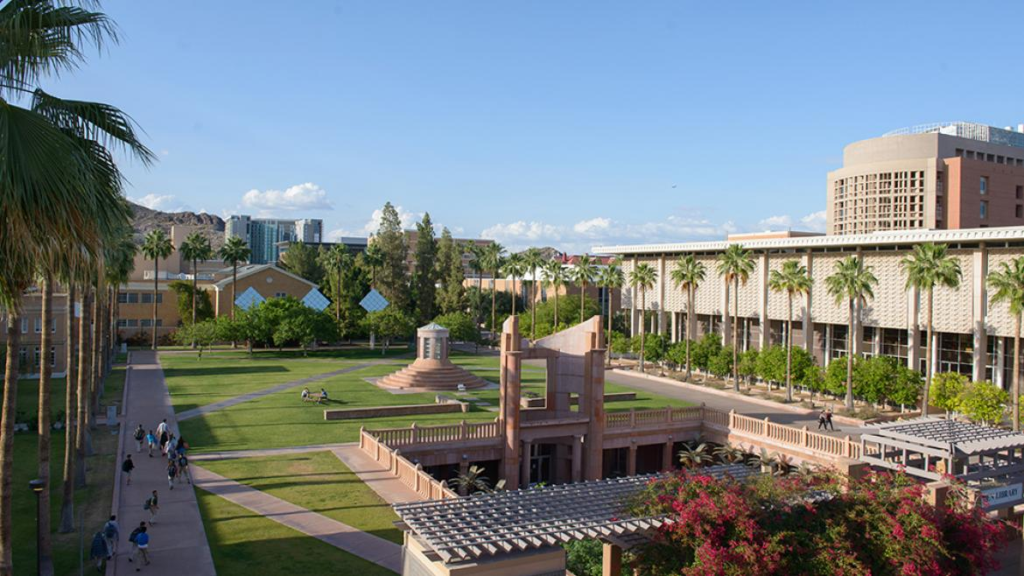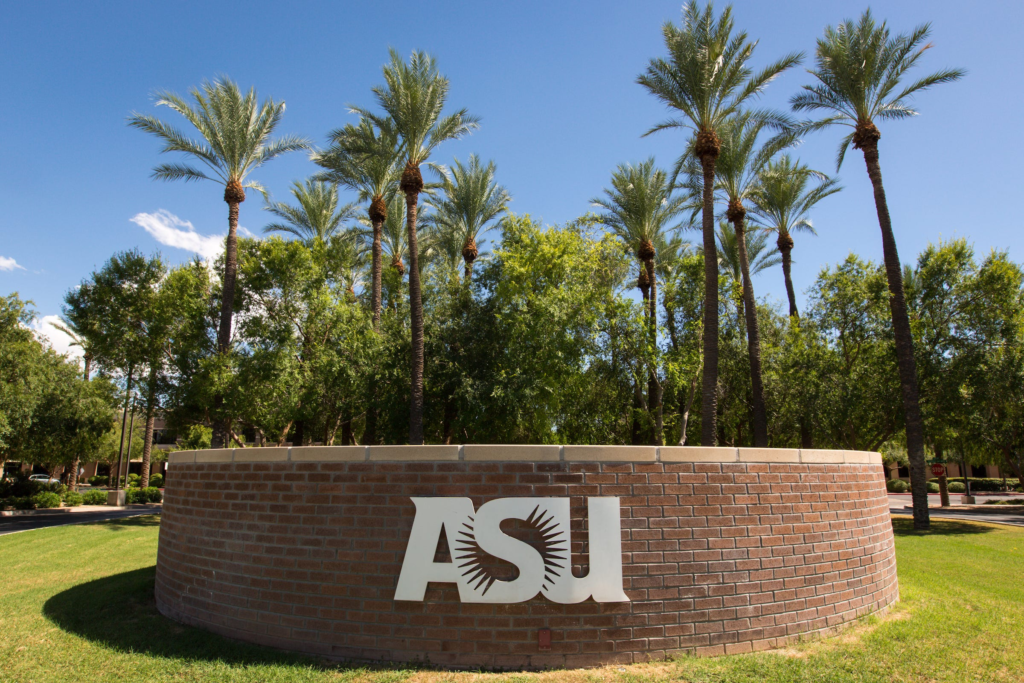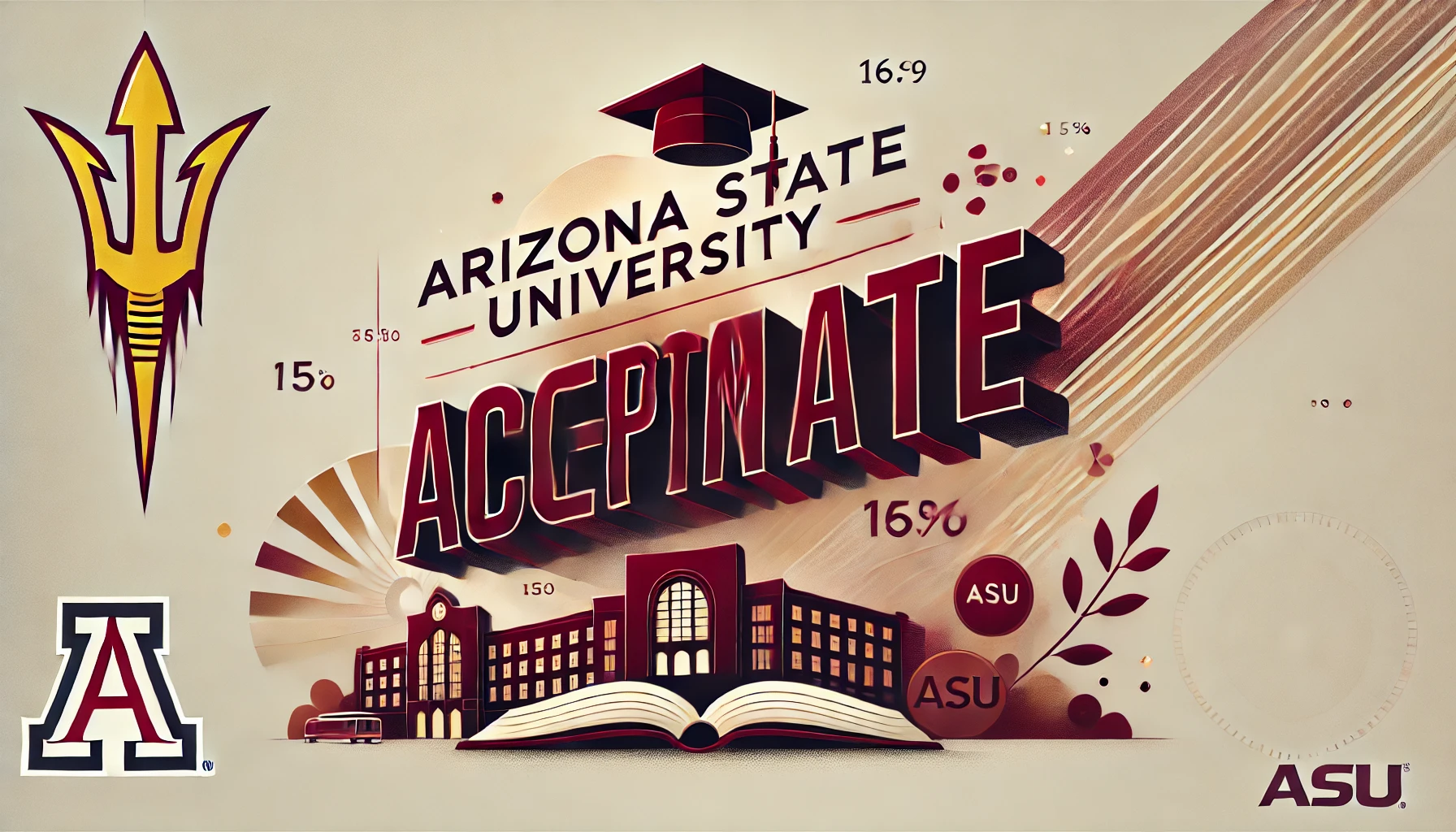Arizona State University (ASU) is a name that resonates with innovation, diversity, and academic excellence. Whether you’re drawn to its cutting-edge research opportunities, world-class faculty, or vibrant campus life, ASU offers something for everyone. But how competitive is it to get in? Let’s cut straight to it—Arizona State University Acceptance Rate hovers around 88%, which might sound welcoming, but don’t be fooled. That number varies significantly across programs, applicant types, and academic levels.
In this guide, we’ll dive into everything you need to know about the Arizona State University Acceptance Rate, tailored to help Indian students like you plan their applications effectively. We’ll unpack details like program-specific rates, what makes ASU stand out globally, and tips to secure your spot at one of America’s top public research universities.
Understanding the Arizona State University Acceptance Rate
When we talk about Arizona State University Acceptance Rate, it’s important to go beyond the surface number. Arizona State University Acceptance Rate of 88% reflects its mission to make education accessible, but that doesn’t mean every application gets the green light.
What Affects Arizona State University Acceptance Rate?
- Volume of Applications: With over 100,000 applications annually, selectivity can shift based on the competition.
- Program Competitiveness: Engineering and computer science programs tend to have lower acceptance rates due to high demand.
- Applicant Type: International students face slightly different criteria, including additional language proficiency tests and financial documentation.
To give you a clearer picture, here’s how ASU’s acceptance rates break down across different categories:
| Program Type | Acceptance Rate |
|---|---|
| Undergraduate Programs | 90% |
| Master’s Programs | 40–50% |
| Engineering Programs | 35–45% |
| Computer Science (MS) | 30–40% |
Arizona State University Acceptance Rate by Applicant Type

When it comes to admissions, not all applicants are evaluated the same way. Arizona State University considers factors like residency, academic level, and international status, which significantly impact acceptance rates. Let’s break it down:
Undergraduate Arizona State University Acceptance Rate
Arizona State University’s undergraduate programs are generally more accessible compared to its graduate offerings. With an acceptance rate of around 90%, undergraduates benefit from ASU’s commitment to inclusivity and its robust infrastructure for first-year students.
Key Factors for Undergraduate Admissions:
- Academic Profile: A GPA of 3.0 (on a 4.0 scale) or higher is typically required for in-state applicants, while out-of-state students may face slightly higher expectations.
- Standardized Tests: SAT and ACT scores are optional, but competitive scores (SAT 1120-1360 or ACT 22-28) can strengthen your application.
- In-State vs. Out-of-State: In-state applicants often have higher acceptance rates due to residency preferences, but the gap is narrowing as ASU expands its reach globally.
Arizona State University Acceptance Rate for International Students
For international applicants, including Indian students, the Arizona State University Acceptance Rate is slightly lower than the overall average, ranging between 80–85%. This difference is mainly due to additional criteria that international students must meet.
What Sets International Admissions Apart?
- Language Proficiency: A minimum TOEFL score of 79 (iBT) or an IELTS score of 6.5 is required.
- Financial Documentation: Proof of sufficient funds to cover tuition and living expenses.
- Academic Records: Equivalency of foreign qualifications to U.S. standards.
Pro Tip: If you’re aiming for undergraduate programs, highlight extracurricular achievements or leadership roles in your application. For graduate applicants, research experience and strong recommendation letters can give you an edge.
Arizona State University Acceptance Rate for Master’s Programs
Graduate programs at ASU, especially in fields like engineering and computer science, are significantly more competitive, with acceptance rates ranging from 30% to 50%.
Key Admission Requirements for Master’s Programs:
- GRE Scores: A competitive GRE score (310+) is a strong asset, although some programs may waive this requirement.
- GPA Expectations: A minimum undergraduate GPA of 3.25 for most programs.
- Statement of Purpose (SOP): A well-crafted SOP that highlights your academic journey, research interests, and career goals can make a big difference.
Graduate admissions committees often look for applicants with a unique perspective, demonstrated research capabilities, and a clear understanding of how they’ll contribute to ASU’s academic community.
Program-Specific Acceptance Rates

Engineering at ASU: A Competitive Landscape
Arizona State University’s engineering programs, offered through the Ira A. Fulton Schools of Engineering, are among its most prestigious and competitive offerings. The acceptance rate for engineering programs typically ranges between 35% and 45%, reflecting high demand and rigorous academic standards.
What Sets ASU’s Engineering Programs Apart?
The school ranks among the top 50 engineering programs in the United States, according to U.S. News & World Report. It is particularly renowned for specialties like sustainable engineering, computer systems, and aerospace.
Applicants to these programs should aim for:
- GPA: A strong undergraduate GPA, ideally above 3.5 on a 4.0 scale, to remain competitive.
- GRE: While some programs waive the GRE, a score above 310 can boost your chances.
- Academic Background: Relevant coursework and research experience in engineering fields.
Computer Science: High Demand and Selectivity
Arizona State University’s computer science programs are housed within the School of Computing and Augmented Intelligence, known for cutting-edge research in AI, cybersecurity, and data analytics. The acceptance rate for computer science programs is lower, falling between 30% and 40%.
Why the high selectivity?
- Rising Demand: Computer science has become one of the most sought-after fields globally, and ASU attracts thousands of applications each year from students aiming to leverage its resources and strong industry connections.
- Academic Expectations:
- A GPA of 3.6 or higher is highly recommended.
- Relevant experience in coding, machine learning, or software development adds significant weight to your application.
- For master’s programs, competitive GRE scores (315+), along with strong recommendation letters, are essential.
Trends in Program Competitiveness
ASU’s program-specific acceptance rates have seen subtle shifts over the years due to increasing application volumes. For instance, the computer science program witnessed a 10% rise in applications from 2018 to 2023, driven by ASU’s investment in research facilities and partnerships with tech giants like Intel and Amazon.
Arizona State University World Ranking & Its Impact on Admissions
ASU’s Global Rankings: A Snapshot
Arizona State University consistently ranks among the top institutions in the world, thanks to its commitment to innovation, research, and inclusivity. Here’s how it stands on key platforms:
- U.S. News & World Report (2024): Ranked 121st globally and 47th among public universities in the United States.
- Times Higher Education (2024): ASU is placed in the top 200 worldwide, excelling in sustainability and technology-related disciplines.
- QS World University Rankings (2024): Ranked 179th globally, reflecting its growing academic and research footprint.
ASU has also been recognized as the #1 university for innovation in the U.S. for nine consecutive years, outranking heavyweights like Stanford and MIT.
How Rankings Influence Admissions
High rankings often result in an increase in application volumes. Over the past decade, ASU has seen a 15% annual growth in applications, particularly in STEM fields like engineering and computer science. This growing demand impacts acceptance rates, making competitive programs even more selective.
For prospective students, ASU’s rankings translate into:
- Global Recognition: Degrees from ASU carry prestige and open doors to international job markets.
- Research Opportunities: Its standing attracts significant research funding, exceeding $700 million annually, enabling students to engage in groundbreaking projects.
- Alumni Success: Graduates from ASU are employed at top companies like Google, Intel, and Boeing, enhancing the university’s reputation and desirability.
Rankings and Your Decision
For Indian students, ASU’s global rankings highlight its value proposition: a world-class education with relatively accessible admissions criteria compared to Ivy League schools. Combined with its focus on innovation, ASU offers a robust pathway to academic and professional success.
Costs, Fees, and Financial Considerations for International Students

Tuition Fees for International Students
For Indian and other international students, understanding the cost of education at ASU is a critical factor in decision-making. The tuition fees vary depending on the program and level of study:
- Undergraduate Programs: Tuition ranges between $29,000 and $33,000 per year for most courses.
- Graduate Programs: Tuition for master’s degrees, such as computer science or engineering, typically costs between $24,000 and $28,000 per year.
- Specialized Programs: Degrees like MBA or law can cost upwards of $40,000 annually.
Additional Costs to Consider
International students must also account for living expenses, which can add significantly to the overall cost of studying abroad. Here’s an estimate of key expenses:
- Accommodation: On-campus housing ranges from $8,000 to $12,000 per year, while off-campus options can be more economical depending on the location.
- Living Expenses: Including food, transportation, and personal expenses, students should budget approximately $15,000 annually.
- Health Insurance: ASU mandates health insurance for international students, costing around $2,500 per year.
Frustrated with Generic College Lists from AI Tools?
Get a tailored college shortlist crafted by study abroad experts who understand YOUR goals, profile, and aspirations.

Scholarships and Financial Aid
ASU offers various scholarships and funding opportunities to help reduce the financial burden for international students:
- New American University Scholarship: Merit-based awards that can cover a significant portion of tuition, based on academic performance.
- Graduate Fellowships: Many graduate programs offer assistantships or fellowships that include stipends and tuition waivers.
- External Scholarships: Organizations like the Fulbright Program and Inlaks Shivdasani Foundation provide funding to Indian students pursuing higher education in the U.S.
Return on Investment (ROI)
Despite the high upfront costs, ASU provides strong ROI due to its global reputation and industry connections. Graduates frequently secure roles at top-tier companies with starting salaries averaging $70,000–$85,000 per year in STEM fields.
Tips to Improve Your Chances of Admission
Securing admission to Arizona State University, especially in competitive programs like engineering or computer science, requires a well-planned strategy. Here’s how you can boost your chances:
Focus on Academic Excellence
- Undergraduate Applicants: Aim for a GPA of 3.0 or higher (on a 4.0 scale), and if your GPA falls short, emphasize strong standardized test scores. Although SAT/ACT is optional, a high score (e.g., SAT 1350+) can set you apart.
- Graduate Applicants: A GPA above 3.5 and competitive GRE scores (310+) are often expected for programs like computer science and engineering. Supplement your application with relevant coursework, certifications, or online projects in your field.
Craft a Compelling Personal Statement
Your Statement of Purpose (SOP) should narrate a clear and unique story. Avoid generic descriptions and focus on:
- Your Motivation: Why you’re passionate about your chosen field.
- Your Impact: Highlight significant academic or professional achievements.
- Your Fit: Explain why ASU is the perfect place for your goals.
Use specific examples, such as research projects or internships, to make your application memorable.
Leverage Strong Recommendation Letters
For graduate applicants, letters of recommendation can make or break your application. Choose referees who:
- Know you well academically or professionally.
- Can provide specific examples of your skills, leadership, and achievements.
Ensure they tailor the letter to the program you’re applying to, showcasing why you’re a standout candidate.
Demonstrate Extracurricular Engagement
ASU values well-rounded applicants. Showcase leadership roles, community involvement, or achievements in competitions and events. For example, being part of a robotics club or leading a college-level hackathon demonstrates skills relevant to engineering and computer science programs.
Plan Early and Apply Strategically
- Deadlines Matter: ASU operates on a rolling admissions basis for many programs, but applying early increases your chances of acceptance and scholarship consideration.
- Program-Specific Requirements: Review and meet all prerequisites for competitive programs. For instance, submitting a portfolio or technical project might be necessary for fields like computer science.
Prepare for Language Proficiency Tests
For Indian students, achieving high scores in TOEFL (79+) or IELTS (6.5+) is crucial. Strong language skills can also reflect positively in your SOP and other written materials.
Highlight Your Uniqueness
Arizona State University values diversity. Reflect on your cultural experiences, challenges overcome, or unique perspective in your essays and interviews.
Conclusion: Your Path to Success at ASU
Arizona State University offers a unique combination of academic excellence, global recognition, and diverse opportunities. With an acceptance rate of 88% overall, ASU provides a welcoming environment, but the competitiveness of specific programs like engineering and computer science cannot be overlooked.
Understanding the factors influencing admission—such as academic requirements, program-specific selectivity, and financial considerations—can significantly enhance your application strategy. Whether you’re an undergraduate or graduate applicant, taking proactive steps like excelling academically, crafting a standout SOP, and leveraging strong recommendations can set you apart. For Indian students, ASU presents an exciting pathway to a global education with high ROI. From its top-ranked programs to scholarships and job opportunities, the university equips you for success in both academia and your professional journey.
Now that you have all the information you need, the ball is in your court. Start early, stay focused, and build an application that reflects your unique potential. Remember, the effort you invest today will pave the way for a transformative experience at one of the world’s most innovative universities.




